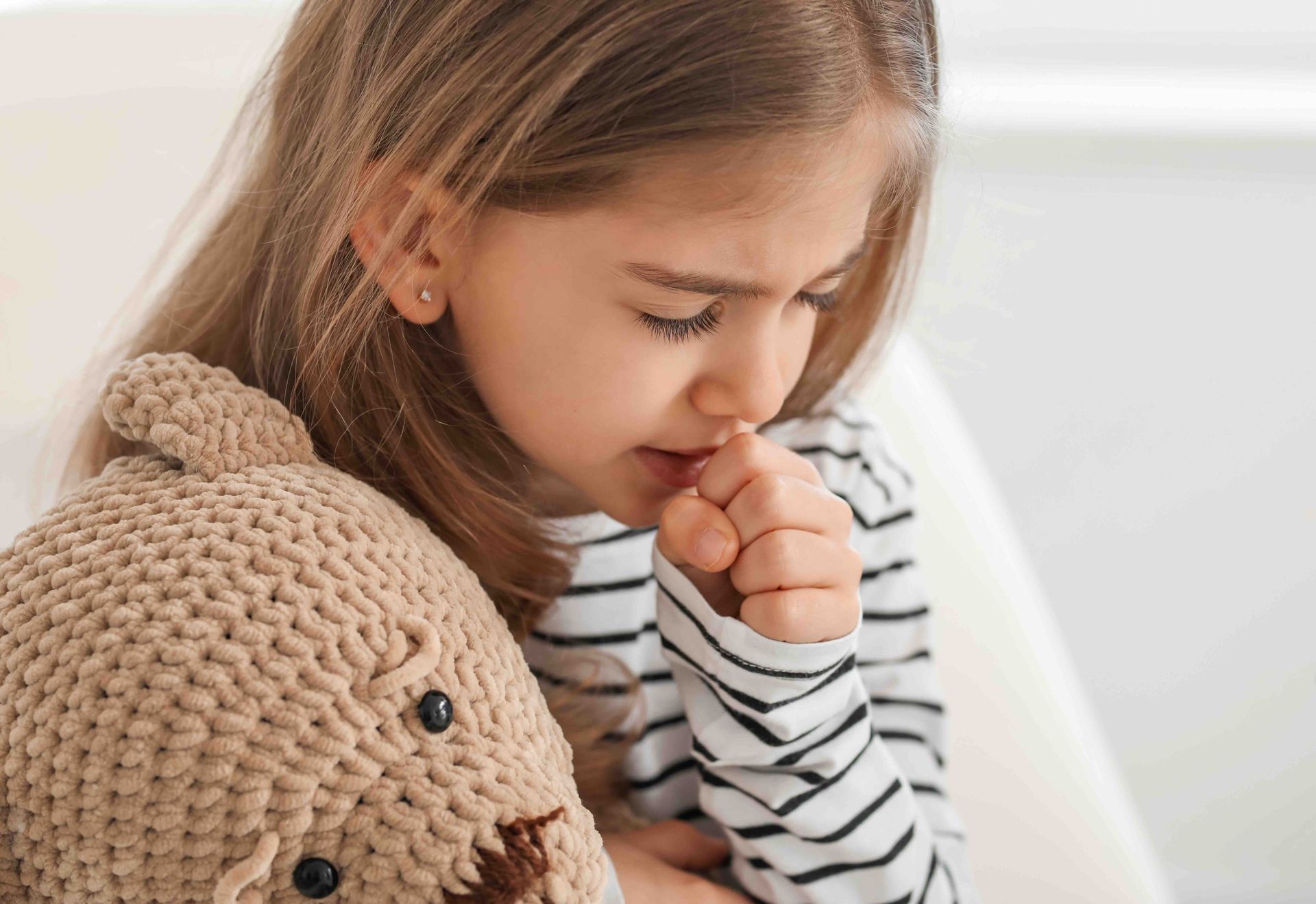8 Common Illnesses in Infants and Children and How to Manage Them
When your child is sick, it can be overwhelming and stressful to figure out how to help them feel better. Infants and young children are susceptible to many childhood illnesses that can range in severity and risk. While some conditions can be managed at home, others may require professional care.
At
Family Medical Center, we have helped many Michigan parents manage common illnesses in babies and young children. Knowing how to manage the symptoms at home and when to consult a healthcare provider can make all the difference in providing effective care for your child.
In this post, we will outline the 8 most common childhood illnesses, their home remedies, and when you should call a healthcare professional.

1. Handling Fevers in Children
Fevers are quite common in children and are typically the body’s natural response to fighting infections or viruses. Many parents’ knee-jerk reaction is to worry when their child has a fever, but know that fevers are often normal and expected.
However, you’ll certainly want to keep an eye on your child’s condition. If your fever has a continuous fever or it starts to rise, try a cool compress, encourage them to drink as much water as possible, and ensure they get plenty of rest.
For babies under three months, we recommend consulting a healthcare professional even if they have a low fever. If they have a rectal temperature of 100.4℉, seek guidance immediately.
For older children, medications like acetaminophen (Tylenol) and ibuprofen (Advil or Motrin) can bring comfort. Follow dosage instructions based on your child’s age and weight.
If the fever persists for more than three days, exceeds 104°F, or is accompanied by symptoms like difficulty breathing or severe lethargy, call a
healthcare provider.
2. Managing Cold and Cough Symptoms
If you’re an experienced parent, you know that cold symptoms like a runny nose, sneezing, and coughing are common in children, especially during colder months. If your child has any of these symptoms, you can use saline drops to clear nasal passages and try steam therapy.
Running a humidifier in your child’s room can also help ease breathing. Moreover, make sure your child stays hydrated and gets plenty of rest.
As far as over-the-counter medications are concerned, know what you’re giving your child and what their pediatrician recommends. Many standard cold meds are not safe for infants and young children.
Keep in mind that the
FDA doesn’t recommend OTC medicines for cough and cold symptoms in children younger than two as they could cause serious side effects. Instead, ask a pediatric healthcare provider to offer safer alternative recommendations.
3. Treating Ear Infections
In infants and children, ear infections often follow a cold, showing signs like tugging at the ear, irritability, and sometimes fever. These are quite common, with five out of six children getting at least one ear infection by their third birthday.
You can use a warm compress, like a clean towel, and place it over the ear to relieve pain. Just like when managing a fever or cold, be sure your child stays hydrated and gets enough shut-eye.
However, if your child is getting worse or the infection lasts more than two to three days, call your healthcare provider. Ear infections typically require antibiotics, which are best administered under professional care.
4. Dealing with Vomiting and Diarrhea
In the US, young children have an average of two episodes of diarrhea each year. Typically, viral infections, food intolerances, or stomach flu can cause vomiting and diarrhea in children.
Hydration is key to helping manage your child’s symptoms at home. Help your child with small sips of oral rehydration solutions (ORS) throughout the day to prevent dehydration.
While the BRAT diet (bananas, rice, applesauce, toast) was once considered a golden standard to soothe an upset stomach, the
American Academy of Pediatrics (AAP) and many healthcare providers have moved away from it.
Instead, focus on fluids, a bland nutrient-rich diet, and smaller meals until your child recovers. If symptoms are persistent, your child develops severe abdominal pain, or you notice signs of dehydration, see a healthcare professional
right away.
5. Caring for Rashes and Skin Irritations
Children and infants frequently develop rashes, from diaper rash to eczema and heat rash. Proper infant illness care often includes managing these skin issues. Fortunately, it’s possible to manage most types of rashes and skin irritations at home.
If your child has a rash, keep the affected area clean and dry. Use safe skin care products such as fragrance-free lotions and creams specifically designed for children. Not every rash will warrant a trip to the healthcare provider.
However, if the rash is accompanied by a fever or it doesn’t improve after a few days of home care, you should seek professional advice.
6. Managing Sore Throat and Strep
Sore throats are common in school-aged children, often a result of viral or bacterial infections. However, most conditions can be treated at home, as only 3 in 10 children with a sore throat can develop strep throat.
For children over one year, honey can help soothe the throat. Warm liquids and saltwater gargles can also provide relief.
If your child has a sore throat with a fever, headache, or swollen lymph nodes, call a healthcare provider for a strep test.
7. Treating Constipation and Digestive Issues
Constipation is another common complaint among children, especially those who are transitioning to solid foods or have low fiber intake. Most cases are temporary and can be treated with a few lifestyle changes.
If your child suffers from constipation, encourage a fiber-rich diet, plenty of fluids, and physical activity. A couple of hours on the playground can help them digest the food. You can also try prune juice or fiber supplements to help alleviate digestive issues.
However, persistent constipation with vomiting and abdominal pain will require professional care. See a healthcare professional for further evaluation if your child has these symptoms.
8. Handling Allergies and Asthma
Allergies are typical among kids and are often seasonal. According to the CDC, nearly 1 in 5 children (18.9%) have a seasonal allergy, 10.8% have eczema, and 5.8% have a food allergy.
As common as they are, allergy symptoms vary, ranging from sneezing and a runny nose to more severe respiratory issues like asthma.
Keeping your home clean and dust-free, using air filters, and avoiding known allergens like pet dander and pollen can help. Be sure your child uses their inhaler or nebulizer properly if they have asthma. Consult your healthcare provider to develop an asthma action plan in case of emergencies.

In Summary
Managing common illnesses in infants and young children can be challenging. The good news? Knowing how to care for your child at home and recognizing when to call a healthcare provider will help you provide the best care.
Your healthcare professional knows what’s best for your child. They can help you handle symptoms that require proper diagnosis, antibiotic treatments, and other interventions.
The bottom line: do your research, trust your instincts, and don’t hesitate to seek professional help when needed.
Dealing with a Sick Infant or Child? We’re Here to Help.
Dr. Barnett and Nurse Practitioner KC Bellin have helped many Michigan parents treat common illnesses in their children. At Family Medical Center, we ensure your child receives the comfort and care they deserve, whether it’s a cold, ear infection, or fever.
If your child has more specific needs, we can certainly refer them to a qualified specialist in the Lake Odessa area.
Schedule your appointment to diagnose your child’s symptoms.
Your Family’s Health Is Our Priority
Your wellness matters to us. Take the next step in your care today.
1020 4th Ave
Lake Odessa, MI 48849
oFFICE HOURS
- Mon - Tue
- -
- Wed - Thu
- -
- Fri - Sun
- Closed
AFTER HOURS EMERGENCY CONTACT
1020 4th Ave
Lake Odessa, MI 48849
oFFICE HOURS
- Mon - Tue
- -
- Wed - Thu
- -
- Fri - Sun
- Closed
AFTER HOURS EMERGENCY CONTACT
All Rights Reserved
FAMILY MEDICAL CENTER
website designed by SPECK DESIGNS
All Rights Reserved | FAMILY MEDICAL CENTER
website designed by SPECK DESIGNS





